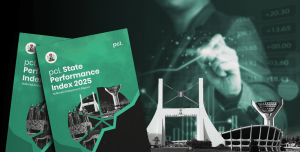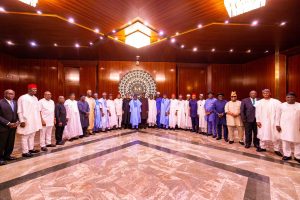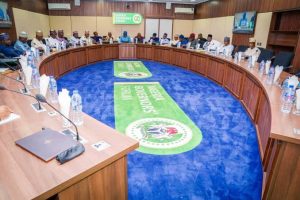Nigeria’s Scorecard: Phillips Consulting Unveils 2025 State Performance Index

Nigeria system is experiencing an era where data is increasingly seen as the new oil wealth, and Phillips Consulting Limited (PCL) has positioned itself as a pioneer of evidence-driven governance in Nigeria. The firm has just launched the 2025 State Performance Index (pSPI). A sweeping assessment of how Nigeria’s 36 states and the Federal Capital Territory are faring in governance, economic management, and social development.

Now in its third edition, the pSPI has matured into one of the country’s most anticipated governance scorecards. It evaluates performance across 37 Key Performance Indicators (KPIs) that span health, education, infrastructure, governance, digital access, and economic development. What distinguishes the 2025 edition is not just its breadth but also its depth and a blend of hard numbers and lived realities.
With nearly 10,000 citizens surveyed nationwide, the index balances objective indicators with perception-based data in a 70:30 ratio. This approach paints a dual picture: one of statistical progress and decline, and another of how Nigerians themselves judge the quality of leadership, services, and institutions around them.
Governance in Numbers and Narratives: At its heart, the pSPI challenges governors and policymakers to look beyond rhetoric. For state executives, the scorecard functions both as a mirror and a map, reflecting how their states are perceived and where reforms are urgently needed.

Phillips Consulting’s methodology ensures that issues like fiscal sustainability, service delivery, and public trust are captured alongside global development concerns such as clean water and sanitation, aligning the findings with the Sustainable Development Goals (SDGs).
Key Findings Contrasts across the States: The 2025 pSPI paints a picture of uneven progress, where some states gleam and others stumble.
- Fiscal Sustainability: Amid Nigeria’s growing debt concerns, states like Jigawa and Kaduna are standing out for prudent financial management. Jigawa ranks first in debt per capita, while Kaduna tops in asset growth, offering models of healthy balance sheets at a time when many states face looming fiscal stress.
- Inclusive Development: A striking finding emerges in resource-rich states. Rivers State, despite generating enormous revenues, scores low on citizen satisfaction. The disconnect between wealth and welfare raises sharp questions about how revenues are deployed, and whether citizens feel the dividends of economic abundance.
- Public Service Trust: Trust in institutions remains a defining factor for governance. States such as Gombe, Jigawa, Niger, and Osun scored high on citizen satisfaction with the honesty of public servants and quality of social services. In a climate of national skepticism, these ratings offer both validation and a competitive benchmark for other states.
- Basic Infrastructure: Everyday services including clean water, sanitation, environmental cleanliness, etc., emerge as powerful indicators of progress. Akwa Ibom, ranked first in environmental cleanliness and third in water access, has become a model for service-driven governance. Similarly, Gombe, Jigawa, Cross River, Yobe, Benue, and Kebbi show notable improvements in basic infrastructure, earning citizen approval.
Business and Economic Implications: considering businesses, the pSPI is more than an academic exercise; it is a practical tool for decision-making. Investors are increasingly attentive to governance metrics in determining where to place capital. A state’s ability to manage debt, sustain revenue, and build trust with its citizens translates directly into investor confidence.
As noted by Dr. Ayotunde Coker, a governance and business analyst, he said – “States that combine fiscal discipline with transparent service delivery are positioning themselves as the next frontiers for private sector investment. Indices like the pSPI create competitive pressure for states to know that they are being measured, and that visibility shapes investment choices.”
Indeed, as Nigeria seeks to diversify beyond oil, states that demonstrate sound economic management are more likely to attract foreign direct investment (FDI), donor partnerships, and public-private projects.
Humanitarian and Social Dimensions: Beyond business and governance, the pSPI highlights the humanitarian stakes of development. For millions of Nigerians, particularly in rural areas, governance is not an abstract concept but a matter of survival. Access to clean water, reliable healthcare, and functioning schools determine whether families thrive or remain trapped in cycles of poverty.
Take water and sanitation: in states like Akwa Ibom or Kebbi, progress means reduced child mortality, better public health outcomes, and greater dignity for marginalized communities. Conversely, in states where basic infrastructure lags, the humanitarian toll is severe, as it immensely contributes to displacement, disease outbreaks and deepening inequality.
By integrating citizen voices, the index underscores how governance intersects with daily life. Trust, or its absence, affects whether citizens comply with tax regimes, support reforms, or resist through protest and unrest.

Political Resonance: the launch of the pSPI arrives at a politically charged moment. Nigeria’s subnational leaders face growing scrutiny from citizens demanding transparency, accountability, and results. With 2027 elections on the horizon, scorecards like this carry significant weight.
For opposition parties, poor rankings offer ammunition to challenge incumbents. For reform-minded governors, strong showings provide a platform to tout achievements and attract both political and financial capital.
Civil society organizations are also seizing on the data to push for reforms. “The pSPI empowers citizens with facts” said Hauwa Bello, director of a governance advocacy NGO in Abuja. “It strips away propaganda and forces leaders to engage with evidence. That is democracy in action.”
The Envisage: by unveiling the 2025 State Performance Index, Phillips Consulting Limited is not merely releasing a report, she is shaping a national conversation about governance, accountability, sociocultural consideration and the future of development in Nigeria.
The challenge, however, lies in moving from measurement to meaningful reform. Indices can highlight where progress is stalling, but it is political will, institutional strength, and citizen engagement that will determine whether Nigeria’s states rise to the challenge.
As one survey respondent from Niger State put it, “We don’t want promises. We want water, schools, and jobs. Let the scorecard mean something real in our lives.”
For Nigeria, where disparities between wealth and welfare remain stark, the pSPI is both a diagnostic and a call to action. Whether governors heed that call may well determine not just their political fortunes, but the trajectory of the nation itself.









